The Austrian film Sissi (Ernst Marischka, 1955), starring Romy Schneider and Karlheinz Böhm, is the first instalment in the hugely popular trilogy of films about Empress Elisabeth of Austria, who was known to her family as 'Sissi'.
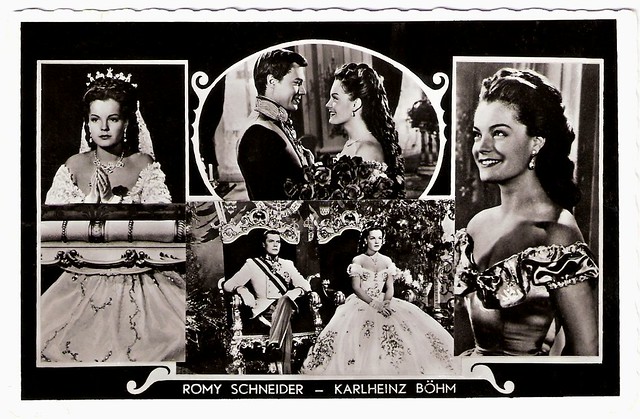
Dutch postcard by N.V. Int. Filmpers (I.F.P.), Amsterdam, no. 1027.
Sissi (Ernst Marischka, 1955) is based around Elisabeth's young years 1852–1854. Princess Elisabeth, nicknamed Sissi (Romy Schneider), is the second oldest daughter of Duke Maximilian Joseph of Bavaria (Gustav Knuth) and Princess Ludovika of Bavaria (Magda Schneider).
Elisabeth is a carefree, impulsive and nature-loving child. She is raised with her seven siblings at the family seat Possenhofen Castle on the shores of Lake Starnberg in Bavaria. She has a happy childhood free of constraints associated with her royal status.
With her mother and her demure older sister Helene (called Néné), 16-year-old Sissi travels from Possenhofen to the spa town of Bad Ischl in Upper Austria. Ludovika's sister, Archduchess Sophie (Vilma Degischer), is the mother of the young emperor Franz Joseph I of Austria (Karlheinz Böhm).
Helene (Uta Franz) is called by Archduchess Sophie to meet the young emperor Franz Joseph in the imperial villa so that the two might be immediately engaged. Sissi is unaware of the real reason for the journey and is forbidden by her aunt to participate in any social events due to her rebellious ways.
Sissi spends her time fishing in the forest where by chance she meets Franz Josef. The emperor is unaware that the girl is his cousin Sissi. He takes a liking to her and invites her for an afternoon hunting trip in the Alps.
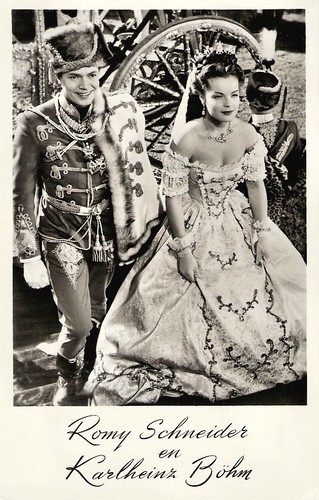
Dutch postcard by Takken, Utrecht, no. 2064. Romy Schneider and Karlheinz Böhm.
They meet as arranged in the mountains where they talk and become acquainted. Sissi falls in love with him but does not reveal her true identity. During their trip, Sissi learns of the planned marriage between Franz Joseph with her sister. The Emperor confesses that he envies the man who will marry Sissi and confesses that he feels no connection to Néné.
Upon hearing his indirect declaration of love, Sissi becomes distraught due to her loyalty to Néné. She runs away from Franz Joseph without any explanation.
When Sissi returns to their residence, Néné reveals the reason for the trip to Bad Ischl: to become engaged with Franz Joseph. Unexpectedly, Franz Josef's brother, Carl-Ludwig (Peter Weck), arrives and Sissi is invited by the Archduchess to act as his partner at the Emperor's birthday celebration.
At his birthday party, Franz Joseph is suddenly confronted by Sissi's appearance there with her mother and sister. He realises who Sissi is and tries to talk to her, openly confessing his love and asking her to marry him. Sissi rejects Franz Joseph in order not to betray her sister.
He defies his mother's reservations and Sissi's resistance and announces, to the surprise of his guests, his betrothal to Sissi. Néné is heartbroken and leaves the party crying. Sissi, in a state of shock, is forced to obey the Emperor's wishes.
In Possenhofen, preparations for the wedding have started. Sissi is not excited for her impending marriage, as the hurt Néné has left for an indefinite period. For her sister's sake, Sissi attempts to break her engagement, however, Néné returns with a new suitor, Maximilian Anton, Hereditary Prince of Thurn and Taxis. The sisters reunite and Néné gives her blessings to Sissi for her marriage.
For the wedding ceremony, Sissi travels with her family on the steamboat Franz Joseph down the Danube to Vienna. People line the banks, waving flags and cheering their future Empress. As part of a grand procession, Sissi enters the city in a gilded carriage. The wedding takes place in the Augustinian Church on 24 April 1854.
Although he played her husband in this trilogy, Karlheinz Böhm is only 10 years older than Romy Schneider.
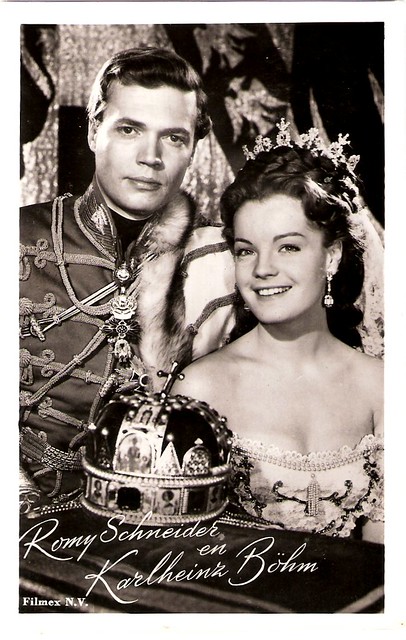
Dutch postcard by Takken, Utrecht, no. AX 1980. Photo: Filmex N.V.
Sissi was filmed in the original places locations where the Empress visited. These locations included Schönbrunn Palace, the Imperial Villa in Bad Ischl and St. Michael's Church.
Sissi was viewed by 20 to 25 million people in the European cinemas. It is one of the most successful German-language films ever.
The film was followed by Sissi - Die junge Kaiserin/Sissi: The Young Empress (Ernst Marischka, 1956) and Sissi - Schicksalsjahre einer Kaiserin/Sissi: The Fateful Years of an Empress (Ernst Marischka, 1957). In 1962, a condensed version of the trilogy was released in English under the title Forever My Love.
The trilogy is a popular Christmas television special in several European countries. The Empress' date of birth on Christmas Eve 1837 adds to the appeal of the film as a Christmas special.
The success of the film marked Empress Elisabeth's entrance to popular culture which made the historical figure even more legendary. The popularity of the films attracted tourists to places which were associated with the Empress, specifically those in Austria. The popularity also led to the creation of the 1992 musical Elisabeth, which became the most successful German-language musical of all time. The trilogy was parodied in the animated film Lissi. (2007)
Romy Schneider's role as Elisabeth is considered her acting breakthrough. She became synonymous with her role in the film, even as she progressed in her acting career.
Schneider reprised the role of Elisabeth in Luchino Visconti's film Ludwig (1972), this time portraying the Empress as a mature yet cynical woman.
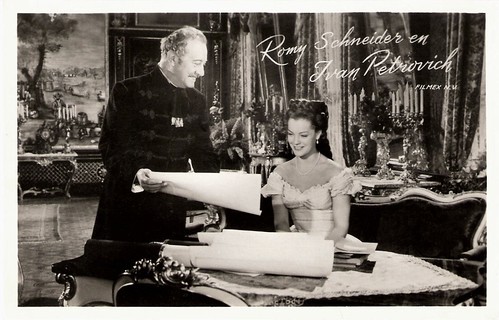
Dutch postcard by Takken, no. AX 3028. Photo: Filmex N.V. Still: scene with Romy Schneider and Ivan Petrovich from Sissi - Die junge Kaiserin/Sissi: The Young Empress (Ernst Marischka, 1956).

Dutch postcard by Int. Filmpers (I.F.P.), Amsterdam, no. 1535. Publicity still for Sissi – Schicksalsjahre einer Kaiserin/Sissi – Fateful Years of an Empress (Ernst Marischka, 1957) with Walter Reyer.
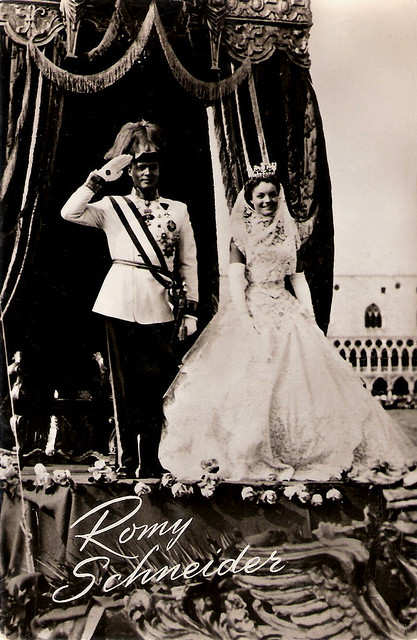
Dutch postcard by Uitg. Takken, Utrecht, no. 3720. Photo: ERMA / Herzog-film-Wien. Publicity still for Sissi - Schicksalsjahre einer Kaiserin/Sissi: The Fateful Years of an Empress (Ernst Marischka, 1957).
Sources: Wikipedia and IMDb.

Dutch postcard by N.V. Int. Filmpers (I.F.P.), Amsterdam, no. 1027.
Carefree, Impulsive And Nature-Loving
Sissi (Ernst Marischka, 1955) is based around Elisabeth's young years 1852–1854. Princess Elisabeth, nicknamed Sissi (Romy Schneider), is the second oldest daughter of Duke Maximilian Joseph of Bavaria (Gustav Knuth) and Princess Ludovika of Bavaria (Magda Schneider).
Elisabeth is a carefree, impulsive and nature-loving child. She is raised with her seven siblings at the family seat Possenhofen Castle on the shores of Lake Starnberg in Bavaria. She has a happy childhood free of constraints associated with her royal status.
With her mother and her demure older sister Helene (called Néné), 16-year-old Sissi travels from Possenhofen to the spa town of Bad Ischl in Upper Austria. Ludovika's sister, Archduchess Sophie (Vilma Degischer), is the mother of the young emperor Franz Joseph I of Austria (Karlheinz Böhm).
Helene (Uta Franz) is called by Archduchess Sophie to meet the young emperor Franz Joseph in the imperial villa so that the two might be immediately engaged. Sissi is unaware of the real reason for the journey and is forbidden by her aunt to participate in any social events due to her rebellious ways.
Sissi spends her time fishing in the forest where by chance she meets Franz Josef. The emperor is unaware that the girl is his cousin Sissi. He takes a liking to her and invites her for an afternoon hunting trip in the Alps.

Dutch postcard by Takken, Utrecht, no. 2064. Romy Schneider and Karlheinz Böhm.
Future Empress
They meet as arranged in the mountains where they talk and become acquainted. Sissi falls in love with him but does not reveal her true identity. During their trip, Sissi learns of the planned marriage between Franz Joseph with her sister. The Emperor confesses that he envies the man who will marry Sissi and confesses that he feels no connection to Néné.
Upon hearing his indirect declaration of love, Sissi becomes distraught due to her loyalty to Néné. She runs away from Franz Joseph without any explanation.
When Sissi returns to their residence, Néné reveals the reason for the trip to Bad Ischl: to become engaged with Franz Joseph. Unexpectedly, Franz Josef's brother, Carl-Ludwig (Peter Weck), arrives and Sissi is invited by the Archduchess to act as his partner at the Emperor's birthday celebration.
At his birthday party, Franz Joseph is suddenly confronted by Sissi's appearance there with her mother and sister. He realises who Sissi is and tries to talk to her, openly confessing his love and asking her to marry him. Sissi rejects Franz Joseph in order not to betray her sister.
He defies his mother's reservations and Sissi's resistance and announces, to the surprise of his guests, his betrothal to Sissi. Néné is heartbroken and leaves the party crying. Sissi, in a state of shock, is forced to obey the Emperor's wishes.
In Possenhofen, preparations for the wedding have started. Sissi is not excited for her impending marriage, as the hurt Néné has left for an indefinite period. For her sister's sake, Sissi attempts to break her engagement, however, Néné returns with a new suitor, Maximilian Anton, Hereditary Prince of Thurn and Taxis. The sisters reunite and Néné gives her blessings to Sissi for her marriage.
For the wedding ceremony, Sissi travels with her family on the steamboat Franz Joseph down the Danube to Vienna. People line the banks, waving flags and cheering their future Empress. As part of a grand procession, Sissi enters the city in a gilded carriage. The wedding takes place in the Augustinian Church on 24 April 1854.
Although he played her husband in this trilogy, Karlheinz Böhm is only 10 years older than Romy Schneider.

Dutch postcard by Takken, Utrecht, no. AX 1980. Photo: Filmex N.V.
Christmas Special
Sissi was filmed in the original places locations where the Empress visited. These locations included Schönbrunn Palace, the Imperial Villa in Bad Ischl and St. Michael's Church.
Sissi was viewed by 20 to 25 million people in the European cinemas. It is one of the most successful German-language films ever.
The film was followed by Sissi - Die junge Kaiserin/Sissi: The Young Empress (Ernst Marischka, 1956) and Sissi - Schicksalsjahre einer Kaiserin/Sissi: The Fateful Years of an Empress (Ernst Marischka, 1957). In 1962, a condensed version of the trilogy was released in English under the title Forever My Love.
The trilogy is a popular Christmas television special in several European countries. The Empress' date of birth on Christmas Eve 1837 adds to the appeal of the film as a Christmas special.
The success of the film marked Empress Elisabeth's entrance to popular culture which made the historical figure even more legendary. The popularity of the films attracted tourists to places which were associated with the Empress, specifically those in Austria. The popularity also led to the creation of the 1992 musical Elisabeth, which became the most successful German-language musical of all time. The trilogy was parodied in the animated film Lissi. (2007)
Romy Schneider's role as Elisabeth is considered her acting breakthrough. She became synonymous with her role in the film, even as she progressed in her acting career.
Schneider reprised the role of Elisabeth in Luchino Visconti's film Ludwig (1972), this time portraying the Empress as a mature yet cynical woman.

Dutch postcard by Takken, no. AX 3028. Photo: Filmex N.V. Still: scene with Romy Schneider and Ivan Petrovich from Sissi - Die junge Kaiserin/Sissi: The Young Empress (Ernst Marischka, 1956).

Dutch postcard by Int. Filmpers (I.F.P.), Amsterdam, no. 1535. Publicity still for Sissi – Schicksalsjahre einer Kaiserin/Sissi – Fateful Years of an Empress (Ernst Marischka, 1957) with Walter Reyer.

Dutch postcard by Uitg. Takken, Utrecht, no. 3720. Photo: ERMA / Herzog-film-Wien. Publicity still for Sissi - Schicksalsjahre einer Kaiserin/Sissi: The Fateful Years of an Empress (Ernst Marischka, 1957).
Sources: Wikipedia and IMDb.
No comments:
Post a Comment